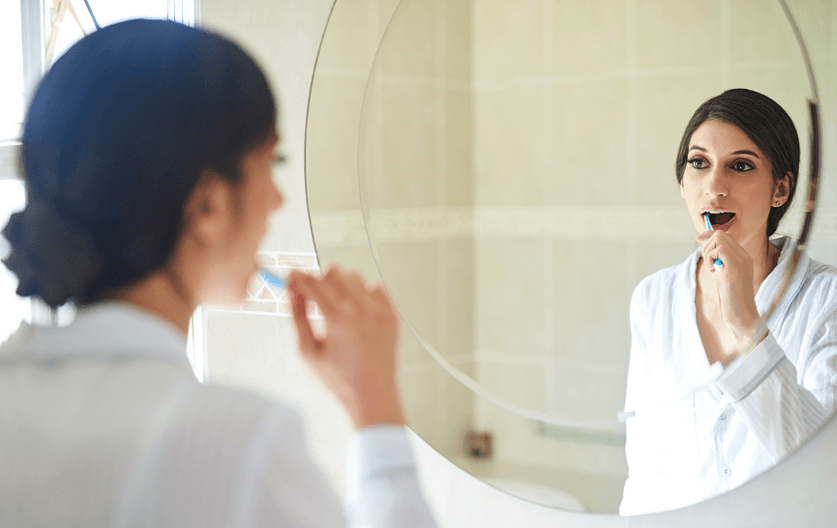- Home
- Mind & body
- What you should know about do-it-yourself dentistry
At CBHS we help you manage your health challenges. We believe in offering you the services, support and tools you need to live your best life.
Our Better Living Programs are available to support eligible members towards a healthier lifestyle. Each Better Living Program is subject to its own eligibility criteria.
Contact us for more information and to confirm your eligibility for a program.
What you should know about do-it-yourself dentistry

This month’s Member Insider is all about do-it-yourself (DIY) dentistry, a trend which has us seeing a growth in enquiries. Are you currently picturing string tied to the doorknob linked to your tooth? It’s not that type of DIY! Please don’t try that either. In this context, ‘DIY dentistry’ is a relative newcomer to the Australian market, and we’re now seeing this concept heavily advertised – generally on social media – as a cheaper way to access dental care.
The technical definition of DIY dentistry
DIY dentistry is the provision of dental treatment without professional examination, diagnosis and treatment planning by an appropriately qualified medical or dental practitioner registered with the Dental Board of Australia and the Australian Health Practitioner Regulation Agency (AHPRA).
Some commonly available treatments include teeth whitening kits, mouthguards and orthodontic kits focused on teeth realignment.
DIY teeth whitening kits and mouthguards are not new to the market and are readily available over the counter and online from retail stores and pharmacies. Keep in mind, with these treatments, best practice is to always consult a registered practitioner to reduce risk and achieve optimal results.
What is concerning is the increasing promotion of DIY orthodontic treatment for teeth realignment on social media. The promotions generally suggest that these DIY products are quicker and cheaper than treatment by a registered practitioner, with some companies claiming that people never need to visit a registered practitioner in person.
What is the risk?
Would you trust your car to someone who hadn’t trained as a mechanic? Orthodontic treatment is a specialised area of dental practice. Appropriate treatment requires a series of steps including clinical examination, special investigations (such as x-rays), with treatment then applied according to a plan carefully managed by a registered practitioner.
Without oversight by a registered practitioner, underlying problems (such as undiagnosed gum disease or unerupted teeth) could be made worse or result in unsuccessful treatment.
Also, the reason for the original orthodontic issue may be more serious and require further investigation, such as an underlying bone disorder or in extreme cases, cancer.
What should I do?
The practice of dentistry is restricted to registered dental and medical practitioners for a good reason. It requires specialised skills and equipment . Dentistry involves careful examination including assessment of any underlying pathology and good treatment planning. Then, careful execution of any treatment with ongoing follow up and care is key to a result you’re happy with.
To achieve the best and safest clinical outcomes, please only access treatment from a registered dental or medical practitioner.
How do I know if my practitioner is registered?
To see if your practitioner is registered, you can do a quick search on APHRA’s website.
Does CBHS cover DIY dentistry?
No. CBHS does not provide benefits for DIY dentistry. If you’re looking at getting dental treatment, we highly recommend seeing a registered practitioner. If you have any questions at all on your treatment plan or provider, please contact us to confirm what benefits are payable before going ahead with any treatment.
I still want straight teeth though
The good news is that there are trusted pathways to a smile you’ll love. CBHS offers Extras cover with orthodontic benefits.
One last thing…
Your smile is important, you’ve only got one – so it’s worth leaving the house to see a registered practitioner for the best results!
Handy links
https://www.aso.org.au/dangers-diy-braces
All information contained in this article is intended for general information purposes only. The information provided should not be relied upon as medical advice and does not supersede or replace a consultation with a suitably qualified healthcare professional.
Health and wellbeing
programs & support
You Belong to More with CBHS Hospital cover:
- Greater choice over your health options including who treats you
- Get care at home with Hospital Substitute Treatment program
- Free health and wellbeing programs to support your health challenges
Live your healthiest, happiest life with CBHS Extras cover:
- Benefits for proactive health checks e.g. bone density tests, eye screenings
- Keep up your care with telehealth and digital options
- Save on dental and optical with CBHS Choice Network providers
